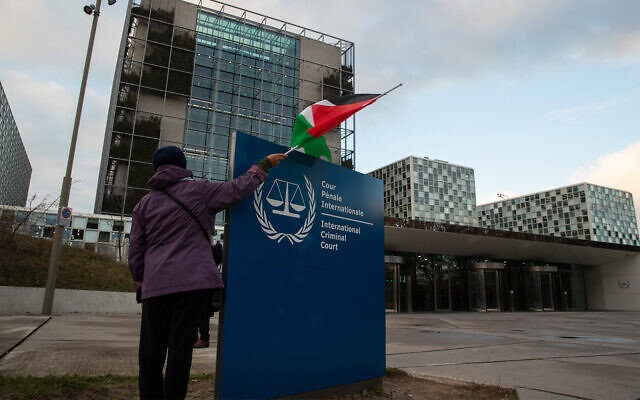Boris Johnson’s anti-ICC stance is an endorsement of Israeli impunity against Palestinians Comment
New in Ceasefire, Politics - Posted on Sunday, April 25, 2021 19:36 - 0 Comments
By Taj Ali

Nov 2019. The Palestinian flag is waved outside the International Criminal Court (ICC) in The Hague, Netherlands, during a rally urging the court to prosecute Israel for war crimes. (Source: AP Photo/Peter Dejong)
Last week, British Prime Minister Boris Johnson announced his opposition to an International Criminal Court investigation into alleged war crimes in the Israeli-occupied territories. In a recent letter to the Conservative Friends of Israel (CFI) network, Johnson claimed the ICC investigation “gives the impression of being a partial and prejudicial attack on a friend and ally of the UK’s.” Such a statement demonstrates a complete lack of empathy for the Palestinian people, many of whom are hoping that the investigation can hold Israel to account for its numerous human rights violations against them.
If governments like our own fail to hold Israel to account for its persecution of the Palestinian people, Israel will have no incentive to comply with international law. Because it knows that it can get away with it. By standing in the way of justice and thus allowing Israel to act with impunity, the British government is complicit in the suffering of the Palestinian people.
Such complicity is nothing new, it spans all the way back to Britain’s colonial history in the region. In 1917, at a time when Palestinians were seeking independence from British rule, the British government issued the Balfour Declaration, promising to establish a national home for Jews in Palestine. This simple act would pave the way for the future displacement and destitution of the Palestinian people.
In 1936, a popular rebellion by Palestinians against British rule was violently put down by the British military. The Palestinian leadership was exiled by the British, and Palestinian military units were forced to disband. This would later make it difficult for Palestinians to resist what would later come to be known as the Nakba – Arabic for “catastrophe”- where, in 1948, over 700,000 Palestinians were driven out from their homeland and over 500 Palestinian villages were destroyed.
For Palestinians, the Nakba is very much ongoing, and it is being aided by our own government. The blockade on Gaza which has created a humanitarian catastrophe, the ongoing encroachment of what is left of Palestinian land in the West Bank through illegal Israeli settlements and the apartheid system where Palestinians in Israeli-occupied territories are subjected to different laws by virtue of their ethnicity, are just some of the many ways in which Israel continues to persecute the Palestinians with the knowledge that governments like our own will simply stand on the sidelines.
Standing idly by in the face of monstrosities is bad enough, but our government has gone a step further by supplying arms to Israel, knowing full well those arms could be used to kill and injure thousands of Palestinian civilians. In 2014, six months before Operation Protective Edge, where over 2000 Palestinians were killed, the UK approved £7 million worth of arms sales to Israel.
In 2018, during the Great March of Return, the Israeli military used live ammunition on peaceful protestors marching to the Gaza border. According to the UN Human rights council, 189 Palestinians were killed, including 32 children. The UN Human rights council also highlighted how over 6000 Palestinians were injured, with many inflicted with life-changing wounds.
In that same year, Britain shamefully abstained from a United Nations’ vote which condemned Israel for “excessive, disproportionate and indiscriminate force” against the demonstrators.
Once again, Britain refused to commit to the protection of Palestinians’ rights as they faced a brutal onslaught by the Israeli military. According to Human Rights Watch, the overwhelming majority of those killed and wounded in the protests were unarmed, and such use of lethal force could constitute war crimes. This is one of many possible war crimes against Palestinians that the ICC is currently investigating and it’s a deep source of shame that our own government is standing in the way of such an investigation.
British governments have used the language of humanitarianism and internationalism for decades to justify participation in murderous conflicts such as the Iraq war in 2003. What the current debacle with the ICC has shown is that such rhetoric is merely empty talk. There is simply no consistency in internationalist values when it comes to British foreign policy. Where are the humanitarian interventionists when Israel uses white phosphorous against civilian populations? Why is it that we only talk about humanitarianism and internationalism when our geopolitical interests are at stake?
The British Government itself asserts that “Promoting international criminal justice and the rule of law are fundamental elements of the United Kingdom’s foreign policy” and yet when it comes to Palestine it seems these principles don’t apply.
This British government cannot continue to bury its head in the sand when it comes to the suffering of the Palestinian people. It’s time for the government to immediately end its complicity. That means ending arms sales to Israel and working constructively with the international community to promote peace and justice in the region through action rather than mere rhetoric.



Leave a Reply